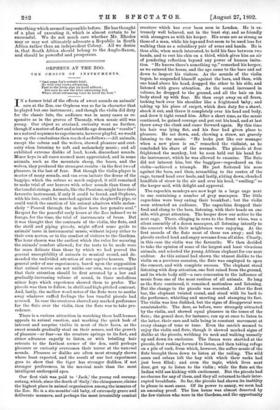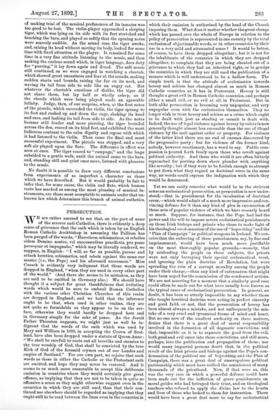ORPFEEUS AT THE ZOO.
THE CHOICE OF INSTRUMENTS.
Last came Joy's ecstatic trial;
He with viny crown advancing.
First to the lively pipe his hand addrest ; But soon he saw the brisk awakening viol.
Whose sweet entrancing voice he loved the best."
TN a former trial of the effects of sweet sounds on animals' ears at the Zoo, our Orpheus was so far in character that he played but one instrument; and though the violin did duty for the classic lute, the audience was in many cases as re- sponsive as in the groves of Thessaly, when music still was young. Our object so attained, curiosity went no further, though if a matter-of-fact and scientific age demands "results" as a natural sequence to experiments, however playful, we would sum up the conclusions then reached as follows :—All animals, except the cobras and the wolves, showed pleasure and curi- osity when listening to soft and melancholy music; and all exhibited extreme dislike of loud, harsh, discordant sounds. Minor keys in all cases seemed most appreciated, and in some animals, such as the mountain sheep, the bears, and the wolves, they produced the strangest results —in the first two of pleasure, in the last of fear. Bat though the violin-player is mister of many sounds, and can even imitate the drone of the bagpipe, which the cobras so much enjoyed, it still remained to make trial of our hearers with other sounds than those of the tuneful strings. Animals, like the Passions, might have their favourite instrument, if only it could be found, and Orpheus, with his lute, could be matched against the shepherd's pipe, or could watch the emotion of his animal admirers while melan- choly "Poured through the mellow horn her pensive soul." Respect for the peaceful early hours at the Zoo induced us to forego, for the time, the trial of instruments of brass. But it was thought that the contrasts of the violin, the flute, and the shrill and piping piccolo, might afford some guide to animals' taste in instrumental music, without injury either to their own nerves, or to the comfort of visitors to the Gardens. The hour chosen was the earliest which the rules for securing the animals' comfort allowed; for the tests to be made were far more delicate than those by which we had proved the general susceptibility of animals to musical sound, and de- manded the undivided attention of our captive hearers. The general order of our experiments, based upon the supposition that animal nerves are not unlike our own, was so arranged that their attention should be first arrested by a low and gradually-increasing volume of sound, in those melodious minor keys which experience showed them to prefer. The piccolo was then to follow, in shrill and high-pitched contrast. And, lastly, the mellow wood-notes of the flute were to soothe away whatever ruffled feelings the less tuneful piccolo had aroused. In case the creatures showed any marked preference for the flute over the violin, then the flute was to take pre- cedence.
There is a curious attraction in watching these half-human appeals to animal emotion, and marking the quick look of interest and surprise visible in most of their faces, as the sweet sounds gradually steal on their senses, and the growth of pleasure—or fear—as the creature springs to its feet, and either advances eagerly to listen, or with bristling hair retreats to the farthest corner of the den, until perhaps pleasure or curiosity overcomes their terror at the unusual sounds. Pleasure or dislike are often most strongly shown where least expected, and the result of our last experiment goes to show that the tiger has stronger dislikes, if not stronger preferences, in the musical scale than the most intelligent anthropoid apes.
Our first visit was paid to Jack,' the young red onrang- °titan& which, since the death of 'Sally.' the chimpanzee, claims the highest place in animal organisation among the inmates of the Zoo. He is a six-months'-old baby, of extremely grave and deliberate manners, and perhaps the most irresistibly comical creature which has ever been seen in London. He is ex- tremely well behaved, not in the least shy, and as friendly with strangers as with his keeper. His arms are as strong as those of a man, while his legs and feet seem to be used less for walking than as a subsidiary pair of arms and hands. He is thus able, when much interested, to hold his face between two hands, and to rest his chin on a third, which gives him an air of pondering reflection beyond any power of human imita- tion. "He knows there's something up," remarked his keeper, as we entered the house, and the ape came to the bars and sat down to inspect his visitors. As the sounds of the violin began, he suspended himself against the bars, and then, with one hand above his head, dropped the other to his side, and listened with grave attention. As the sound increased in volume, he dropped to the ground, and all the hair on his body stood up with fear. He then crept away on all fours, looking back over his shoulder like a frightened baby ; and taking up his piece of carpet, which does duty for a shawl, shook it out, and threw it completely over his head and body, and drew it tight round him. After a short time, as the music continued, he gained courage and put out his head, and at last threw away the cloak and came forward again. By this time his hair was lying flat, and his fear had given place to pleasure. He sat down, and, chewing a straw, sat gravely listening to the music. "He looks just like our manager when a new piece is on," remarked the violinist, as he concluded his share of the serenade. The piccolo at first frightened the monkey, but he soon held out his hand for the instrument, which he was allowed to examine. The flute did not interest him, but the bagpipes—reproduced on the violin—achieved a triumph. He jest flattened his nose against the bars, and then, scrambling to the centre of the cage, turned head over heels, and lastly, sitting down, chucked handfuls of straw in the air and over his head, "smiling," as the keeper said, with delight and approval.
The capuchin monkeys are now kept in a large cage next to one containing a number of grey macaques. The little capuchins were busy eating their breakfast ; but the violin soon attracted an audience. The capuchins dropped their food and clung to the bars, listening, with their heads on one side, with great attention. The keeper drew our notice to the next cage. There, clinging in rows to the front wires, was a silent assembly of a dozen macaques, all listening intently to the concert which their neighbours were enjoying. At the first sounds of the flute most of these ran away ; and the piccolo excited loud and angry screams from all sides. Clearly, in this ease the violin was the favourite. We then decided to take the opinion of some of the largest and least vivacious animals, and selected the young African elephant for our next auditor. As this animal had shown the utmost dislike to the violin on a previous occasion, the bate was employed to open the concert, and with complete success. The elephant stood listening with deep attention, one foot raised from the ground, and its whole body still—a rare concession to the influence of music from one of the most restless of all animals. So long as the flute continued, it remained motionless and listening. But the change to the piccolo was resented. After the first bar, the elephant twisted round, and stood with its back to the performer, whistling and snorting and stamping its feet. The violin was less disliked, but the signs of disapproval were unmistakable. The deer, as before, were strangely attracted by the violin, and showed equal pleasure in the tones of the flute ; the gemul deer, for instance, ran up at once to listen to the latter, their ears and tails being in constant movement at every change of tone or tune. Even the ostrich seemed to enjoy the violin and flute, though it showed marked signs of dislike at the piccolo, writhing its neck and walking uneasily up and down its enclosure. The ibexes were startled at the piccolo, first rushing forward to listen, and then taking refuge on a pile of rock, from which, however, the softer music of the flute brought them down to listen at the railing. The wild asses and zebras left the hay with which their racks had just been filled; and even the tapir, which lives next door, got up to listen to the violin ; while the flute set the Indian wild ass kicking with excitement. But the piccolo had no charms for any of them, and they all returned to their inter- rupted breakfasts. So far, the piccolo had shown its inability to please in most oases. Of its power to annoy, we soon had an amusing proof. The lion house was almost deserted by the few visitors who were in the Gardens, and the opportunity of making trial of the musical preferences of its inmates was too good to be lost. The violin-player approached a sleeping tiger, which was lying on its side with its feet stretched and touching the bars, and played so softly that the opening notes were scarcely audible. As the sound rose, the tiger awoke, and, raising its head without moving its body, looked tor some time with fixed attention at the player. It remained for some time in a very fine attitude listening to the music, and then making the curious sound which, in tiger language, does duty for "purring," it lay down again and dozed. The soft music still continued, as we were engaged in watching a cheetah, which showed great uneasiness and fear at the sounds, making sudden starts and bounds, raising the fur on its neck, and waving its tail from side to side like an angry cat. But whatever the cheetah's emotions of dislike, the tiger did not share them, but lay half or wholly asleep, as if the chords which were being played made an agreeable lullaby. Judge, then, of our surprise, when, at the first notes of the piccolo, which succeeded the violin, the tiger sprang to its feet and rushed up and' down the cage, shaking its head and ears, and lashing its tail from side to side. As the notes became still louder and more piercing, the tiger bounded across the den, reared on its hind feet, and exhibited the most ludicrous contrast to the calm dignity and repose with which it had listened to the violin. Then came the final and most successful experiment. The piccolo was stopped, and a very soft air played upon the flute. The difference in effect was seen at once. The tiger ceased to "rampage," and the leaps subsided to a gentle walk, until the animal came to the bars, and, standing still and quiet once more, listened with pleasure to the music.
No doubt it is possible to draw very different conclusions from experiments of so imperfect a character as those which we have described. But it would probably be fair to infer that, for some cause, the violin and flute, which human taste has marked as among the most pleasing of musical in- struments, are those most acceptable to animals under that un- known law which determines this branch of animal msthetics.



































 Previous page
Previous page